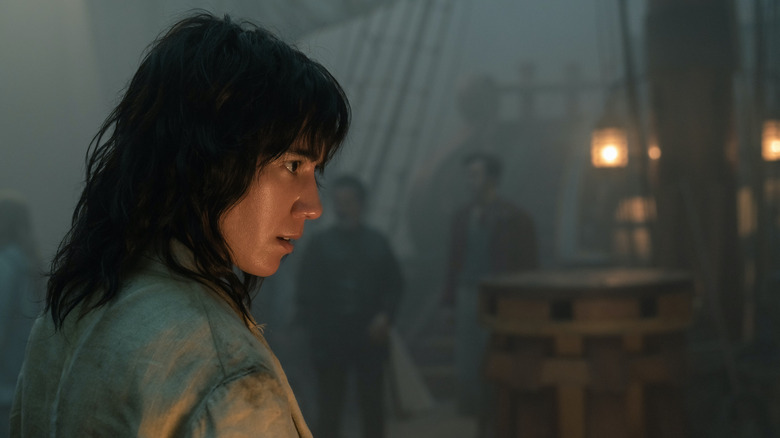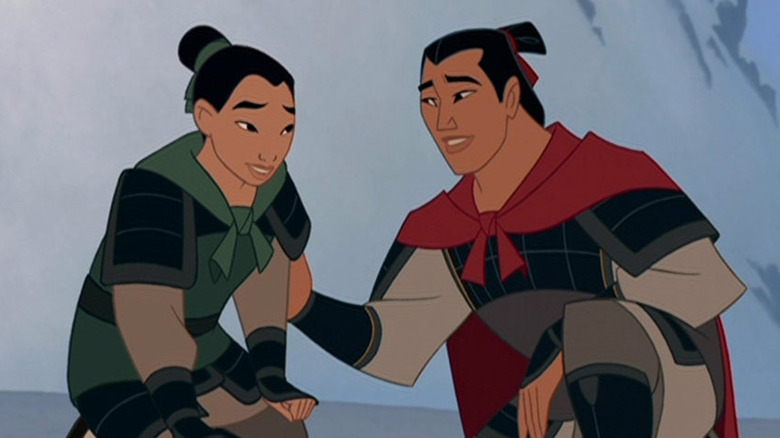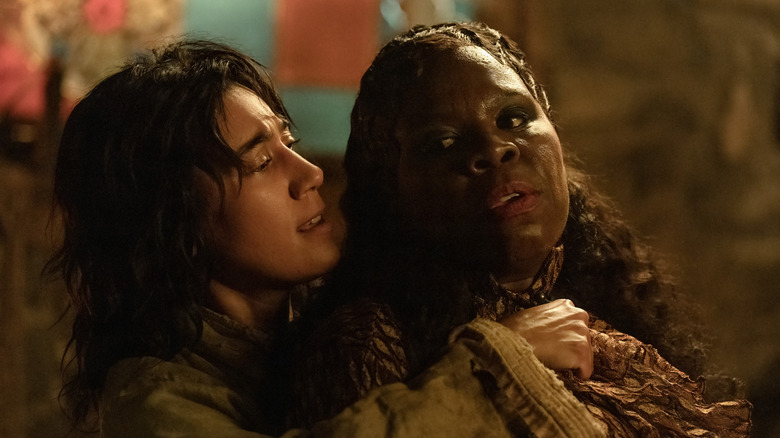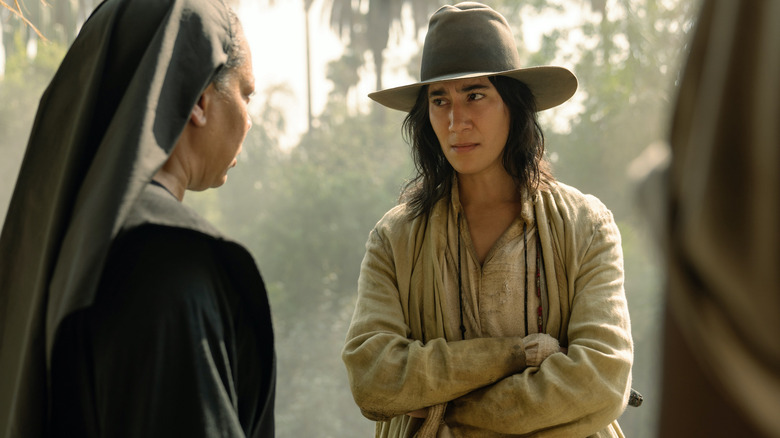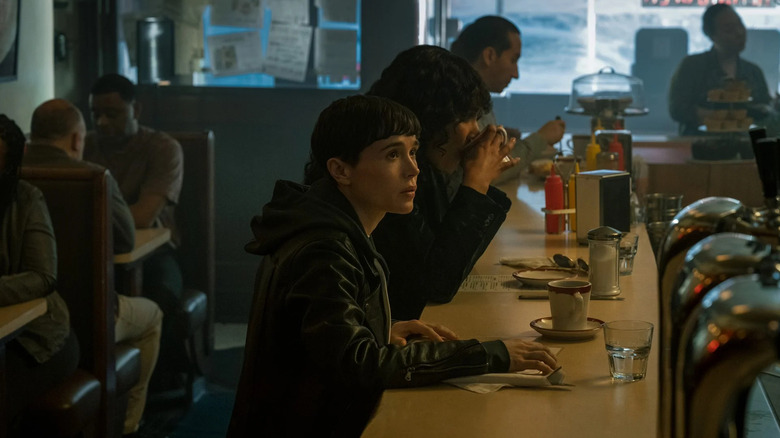Jim The Pirate Is The Real Treasure Of Our Flag Means Death
I was a weird kid. This shouldn't be much of a shock to anyone who's read my writing, because I'm still an unusual individual, but as a child, that weirdness was so much more isolating. Not only did I have undiagnosed ADHD, but early trauma had already started giving me symptoms of what would later become complex post-traumatic stress disorder. To complicate things, I felt like I was in the wrong body: a boy, mistakenly put into the body of a girl. I was a complicated little mess of a person, and I hadn't even hit high school. I sought refuge in comic books, TV, and movies, piecing together an identity from my favorite fantastical characters, who represented me better than anything in the real world.
The X-Men made me feel "mutant and proud." Data in "Star Trek: The Next Generation" and Roy Batty in "Blade Runner" echoed my feelings of being "more human than human," yet wanting desperately to share in normalcy. The characters of "Star Trek: Deep Space Nine" helped me process my gender and sexuality, to some degree. They were meager substitutes for actually seeing myself represented, but they helped give me a sense of self and some confidence. As a teen I clung to problematic representations of gender non-conforming characters, like Hedwig in "Hedwig and the Angry Inch" and Dr. Frank-N-Furter in "Rocky Horror Picture Show," because they were the closest approximation of myself that I could find.
In the past few years, there have been big pushes for better representation, and also a significant amount of pushback. For every small step forward, like having an openly gay character in a kids' movie, there's a conservative politician trying to make life hell for queer kids in response. It's frustrating, and it can make people who don't study media for a living start to get annoyed whenever the words "diversity" or "representation" come up — because it's just a constant back-and-forth. Even I was getting tired of thinking about it and talking about it, because it's exhausting trying to explain why something matters to people who can't relate.
Then I checked out a silly little show about pirates, mostly because I had heard it was funny. The ensemble cast of "Our Flag Means Death" includes a character called Jim, played by Vico Ortiz, who made me feel seen in a way that I had never, ever experienced before. This was not the catharsis of seeing trauma reflected, or the desperate grasping at tropes to create an identity. Instead, I got to see a character like myself as a hero, and their complex gender was discussed, but never pointed to as a source of trauma. It made me feel whole.
Searching for myself
"Our Flag Means Death" is incredible for so many kinds of representation, but Jim gives non-binary and transmasculine people a new hero to see themselves in. I spent my entire childhood seeing myself in roles that didn't quite fit, just like the gender norms impressed upon me like ill-fitting clothing. I loved Princess Leia for her boldness, but felt conflicted by her femininity. (Who has time for those braids?)
I loved Will Riker for being an absolute cad and total badass, but felt disconnected from him because I would never grow a beard or be truly masculine, not in the way I identified it then. The characters who identified with the most were all either beyond gender somehow, like Jadzia Dax or the various androids, or they were allegories for those identities, like the X-Men. The only place people like me existed was in fantasy worlds, and that did a number on my young psyche.
Suicide rates among transgender and non-binary youth are much higher than their cisgender counterparts, but one study in 2018 showed that transgender boys and non-binary adolescents had the highest rate of reported attempted suicides or suicidal ideation. While there are many reasons this may be, and I am not the one to examine them all, in my experience, a part of that might be because of the sheer isolation of being non-binary or transmasculine.
While representations of transgender women are often problematic, they do exist, and there are whole subcultures built around the art of femininity. There is no "Paris is Burning" for little trans boys forced into dresses, no "RuPaul's Drag Race" for masculinity. I remember watching "Mulan" as a child and being furious with Mulan for returning to her feminine role after being so happy as Ping, especially when her love interest, Li Shang, was clearly into Mulan/Ping regardless of gender. (He's Disney's first bisexual prince, and I'll die on that hill.)
The closest I got to feeling represented fully was Janet (D'Arcy Carden) on "The Good Place," as she regularly declares she's "not a girl" (because she is, in fact, more like an angelic construct). While it was nice to have "not a girl!" in my back pocket, Janet was so completely fantastical that it was hard to feel truly seen.
A hero like me
In "Our Flag Means Death," Jim is a pirate aboard Stede Bonnet's (Rhys Darby) ship. He doesn't speak, has a big bushy beard, and wears his wide-brimmed hat low over his eyes. When Jim finally does speak, to his best friend Oluwande (Samson Kayo), the reason for his silence becomes obvious, as his voice is fairly high.
Jim eventually strips to take a bath in the ocean, removing his fake beard (and fake wax nose) to swim around, and Lucius (Nathan Foad) spots him. He realizes the "deception" and swears secrecy, though eventually Jim's situation is revealed to the entire crew. Other than one "Jim's a girl?" the crew almost immediately shrugs it off. They refer to Jim as either "he" or "they" through the rest of the show, and Jim seems fine with both. Jim's gender identity is accepted, just as Jim is accepted, and the crew goes about their merry way. Even Jim's Nana, a nun who raised them, accepts her beloved adopted child for who they are, only using Jim's original name once and then immediately changing course after being corrected.
Jim is probably the most competent person in all of Stede's crew, and they have an incredible showdown with another character who flies in the face of gender norms, Spanish Jackie (Leslie Jones). Spanish Jackie is a woman with 20-ish husbands, a sweet pirate tavern, and a collection of human noses. She's tough and funny, and her outfits ride the line between masculine and feminine. The episode where Jim and Jackie face off felt like what other kids must have felt seeing Superman and Batman go at it all these years, because two characters in whom I could see myself were both being presented as a pair of badasses.
Why behind-the-scenes representation matters, too
In an interview with Entertainment Weekly, Vico Ortiz, who identifies as non-binary and uses they/them pronouns, explained that Jim's story feels authentic because there's non-binary representation off-camera, too:
"When I first read the script, I cried. I was like, 'I can't believe that I'm not even asking for this to be a thing.' In part, it's because we had three non-binary writers in the writers' room. So there's already this space in which this character is being nurtured and taken care of. It's not just like, 'Oh, we're going to hire a non-binary actor to do this. And then they'll fend for themselves.' There was already this space that's created that people already are vouching for this character and their storyline. It felt incredible."
That incredible feeling translates to the screen, and to every non-binary person watching. While I've found some of myself in recent years in horror films like "Possessor" or "Titane," sometimes a person wants to see themselves reflected as something other than a monster. If confused, teenage me could have seen Jim in all of his glory, it could have saved me so much pain. It could have helped me avoid bad relationships that I rushed into in order to find femininity. It could have helped me feel comfortable in my own skin, and it could have made me feel so much less alone in the world.
A big step forward
Trans men are also finally getting some heroic representation on screen, via Elliot Page's character Viktor Hargreeves in "The Umbrella Academy." The character was changed to reflect Page's own experience as a non-binary trans man, and it feels like a watershed moment for non-binary and trans male representation.
These kinds of characters can help all the confused kids out there understand themselves and open up discussions with their loved ones. I didn't have the language to explain myself to my family or friends, and that left me feeling alone for so long. If I had been able to just point to Jim or Viktor and tell my parents "hey, that's me," it would have meant the world.
There are people who see stories like this and clutch their pearls, declaring that no child should know about sexuality. But I'm not talking about sexuality, or who I had crushes on, or even about transitioning, which is a messy and difficult topic. I knew from the time I was five years old that I wasn't a "girl." If I got mistaken for a boy or jokingly called a boy, or teased about being a "tomboy," I was elated. I spent my entire childhood railing against gender norms, embracing tough girls and weird girls because I wasn't quite allowed to embrace boys, although I did have a mighty desire to be Jack Skellington that I ran with for a bit.
Kids know who they are, even if they don't have the words to express it. Representation, especially joyous, celebratory representation, helps give people the tools they need to understand themselves and one another. It saves lives. Thank you Jim, Vico, Viktor, and Elliot. You're paving the way for a brighter future for kids like me.
